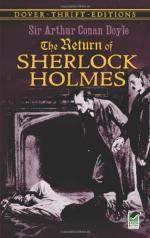Colonel Moran turned to the official detective.
“You may or may not have just cause for arresting me,” said he, “but at least there can be no reason why I should submit to the gibes of this person. If I am in the hands of the law, let things be done in a legal way.”
“Well, that’s reasonable enough,” said Lestrade. “Nothing further you have to say, Mr. Holmes, before we go?”
Holmes had picked up the powerful air-gun from the floor, and was examining its mechanism.
“An admirable and unique weapon,” said he, “noiseless and of tremendous power: I knew Von Herder, the blind German mechanic, who constructed it to the order of the late Professor Moriarty. For years I have been aware of its existence though I have never before had the opportunity of handling it. I commend it very specially to your attention, Lestrade and also the bullets which fit it.”
“You can trust us to look after that, Mr. Holmes,” said Lestrade, as the whole party moved towards the door. “Anything further to say?”
“Only to ask what charge you intend to prefer?”
“What charge, sir? Why, of course, the attempted murder of Mr. Sherlock Holmes.”
“Not so, Lestrade. I do not propose to appear in the matter at all. To you, and to you only, belongs the credit of the remarkable arrest which you have effected. Yes, Lestrade, I congratulate you! With your usual happy mixture of cunning and audacity, you have got him.”
“Got him! Got whom, Mr. Holmes?”
“The man that the whole force has been seeking in vain—Colonel Sebastian Moran, who shot the Honourable Ronald Adair with an expanding bullet from an air-gun through the open window of the second-floor front of No. 427 Park Lane, upon the thirtieth of last month. That’s the charge, Lestrade. And now, Watson, if you can endure the draught from a broken window, I think that half an hour in my study over a cigar may afford you some profitable amusement.”
Our old chambers had been left unchanged through the supervision of Mycroft Holmes and the immediate care of Mrs. Hudson. As I entered I saw, it is true, an unwonted tidiness, but the old landmarks were all in their place. There were the chemical corner and the acid-stained, deal-topped table. There upon a shelf was the row of formidable scrap-books and books of reference which many of our fellow-citizens would have been so glad to burn. The diagrams, the violin-case, and the pipe-rack—even the Persian slipper which contained the tobacco—all met my eyes as I glanced round me. There were two occupants of the room—one, Mrs. Hudson, who beamed upon us both as we entered—the other, the strange dummy which had played so important a part in the evening’s adventures. It was a wax-coloured model of my friend, so admirably done that it was a perfect facsimile. It stood on a small pedestal table with an old dressing-gown of Holmes’s so draped round it that the illusion from the street was absolutely perfect.




